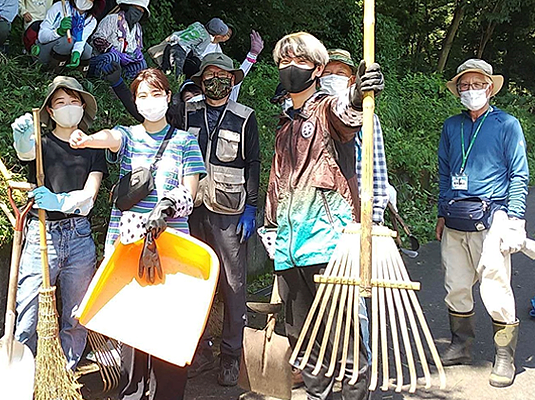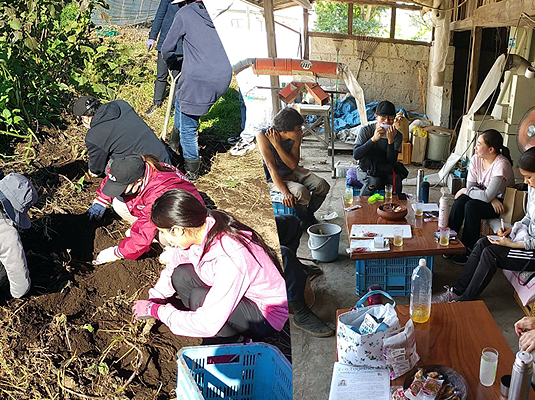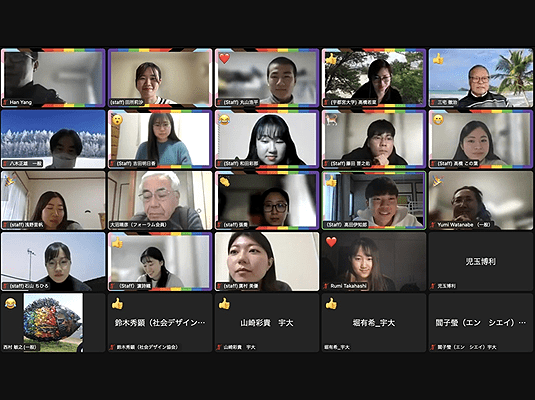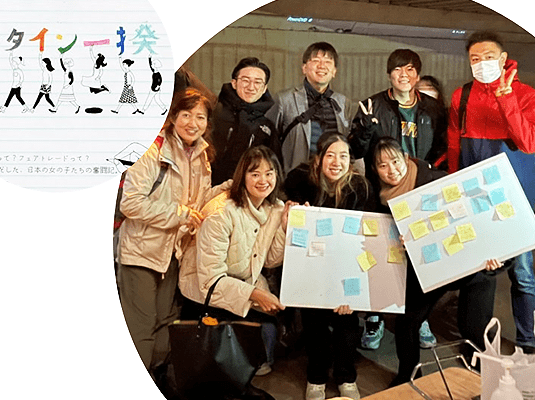Project:UU3S Project
About UU3S Project
UU3S Project stands for Utsunomiya University Students, SDGs, Solution Project.
Issues regarding “decarbonized societies” and “formation of circular societies” have gained importance as a part of political issues in the international societies. In Japan, various problems, including intensified disasters, deteriorating ecosystems and countryside regions, access to sustainable energies, and aging societies with fewer children, are also arising. As the measures to approach these issues in a multidisciplinary and simultaneous rather than individual manner, the concept of “Local SDGs/ Regional Circular and Ecological Sphere” are drawing attention. Local SDGs aims to promote “autonomous and decentralized society” through “partnerships,” to “simultaneously” solve multiple problems, both global and local, that are intricately intertwined.
Utsunomiya City and its surrounding communities in Tochigi Prefecture contain both urban and rural areas, and their geographical conditions make it ideal for promoting Local SGDs. In addition, activities that are in line with Regional Circular and Ecological Sphere are being implemented by numerous entities. However, their ability to dispatch information is quite limited due to financial restrictions and lack of/aging human resources, making it difficult to extend their individual activities to the entire region.
On the other hand, studies have shown that a large number of citizens and students are willing to act to promote SDGs and decarbonized societies, as well as to solve local issues. In many cases, however, they are kept away from such activities because they hesitate, or do not know how, to take specific actions, or do not have any opportunities that are available to them.
In this context, UU3S Project forms partnerships among the University, NPOs and citizens, and offers practical activities and mutual learning opportunities, in order to understand the problem structure and implement and publicize specific activities for solution, leading to the expansion of Regional Circular and Ecological Sphere to the wider area. Our specific practical and research activities encompass the three areas; 1) Education on renewable energy, 2) NBS (Nature-based Solutions: e.g. preservation of mountain regions, citizens’ farm) and 3) Online viewing of SDGs-related films.
Outline of Each Area
Education on Renewable Energy:
Renewable energy is indispensable for the formation of decarbonized societies. Renewable Energy Committee under Utsunomiya Environment Action Forum, a local NGO consisting of former corporate experts in the areas like energy management, works with dedication to promote public awareness through investigation of potential renewable energy at home and delivering lectures to students of elementary and junior high schools regarding climate change and renewable energy. Students in UU3S Project also participate in these lectures as supporters to work on problem finding/solving on this topic. In addition, they prepare reports on sustainable energy in Utsunomiya City in collaboration with NGOs and the students taking the course on Global Environmental Policy.
NBS (Nature-based Solution: Satoyama Conservation, Citizens’ farm, etc.)
Protection, conservation and regrowth of nature in urban areas through urban greening, conservation of surrounding forest areas (known as Satoyama) and citizens’ farms are the principal activities for the formation of Regional Circular and Ecological Sphere. Increased natural environment in urban areas would bring multiple benefits including mitigation of heat-island effect and creation of carbon dioxide sinks to help the formation of decarbonized societies, as well as disaster prevention, improved atmosphere, support for local production for local consumption and community formation. Satoyama Conservation Committee of the aforementioned Forum has long been working with the prefectural branch of Wild Bird Society of Japan on the Satoyama conservation activities in Mizuhono region of the city, carrying out maintenance activities (mowing and cleaning) to preserve the areas’ multifaceted functions including preservation of biodiversity, climate change mitigation and securing places for children for their learning/recreational activities. A member of Information Committee of the Forum also participates in Citizens’ Farm, an activity to utilize a cultivated land that was about to be deserted due to the owner’s advanced age. The farm, called Nazareth Farm, offers organic farming of various vegetables and rice by mothers raising small children under the direction of the owner, Mr. Tsurumi, to generate multiple benefits such as preservation of biodiversity, prevention of water pollution, promotion of local food production for local consumption, and promotion of active participation by the elderly and women.
By getting involved i n these preservation and farming activities, students in UU3S project would learn the significance of Regional Circular and Ecological Sphere, as well as the issues it faces and means to solve them.


Online SDGs Film Viewing:
Online viewings of films a ddressing to SDGs issues have been held since 2021 under the student’s initiatives in order to provide students and citizens with opportunities to learn about SDGs during the current COVID-19 pandemic situation. Film rights are obtained by faculties with the help of the grant from Universities-Communities Collaboration Project in Tochigi, and a group of students have taken charge of selecting movies and planning/managing each event. The films shown in 2021 include “A Plastic Ocean,” “Tomorrow,” “Valentine Ikki” (at Tagawa Bridge Theater), and “The Green Lie.” After each viewing, students give presentations about the contents of the film and what we should do about the issue, to facilitate a general discussion. The impact of the viewings is measured through questionnaires given to participants before and after the event, to see how their perception has changed.

